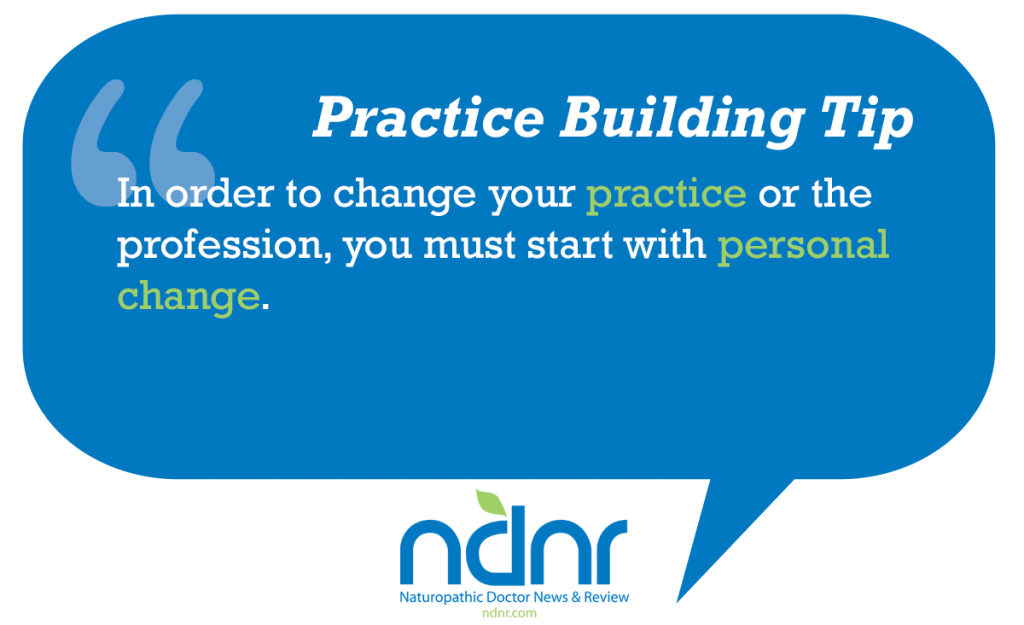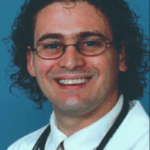Physician and Profession, Heal Thyself
Naturopathic medicine is outlined by a set of principles that we recognize as truth in regards to how the physical body interacts with the world around it. The inherent belief in these principles guides us as we search for answers to health’s most difficult questions. Another thought to consider is “whether other life principles can improve our way of thinking to find the answers we are looking for.”
When seeking to become a naturopathic physician, I personally found the profession’s acceptance and recognition of life-governing principles with regard to health and wellness a soul satisfying motivation and desire to further my study. After completing my degree at NCNM, I have found that further personal studies in other life-governing principles can have a deep positive impact on my naturopathic practice and personal life. With that said, I wanted to extrapolate principles outlined by Stephen Covey in his book the The 7 Habits of Highly Effective People to give professional and personal insight that will positively impact your practice and the profession as a whole.
Stephen Covey in the aforementioned book states that he did not create the habits described, but that he discovered them as inherent principles to effective living. In my personal process of the desire to impart the application of “physician heal thyself” to my life, I came to the realization that life-governing principles are synergistic. As part of a profession with principle-centered logic, I found myself enthusiastically inspired to challenge every colleague to consider and test this theory for the benefit of his or her own personal lives and our collective professional lives.
The Seven Habits (Principles)
If you have not read Covey’s work, I encourage you to do it. Covey’s 7 habits are simply outlined in the following manner:
Dependence to Independence
· Habit 1: Be Proactive: Principles of Personal Choice
· Habit 2: Begin with the End in Mind: Principles of Personal Vision
· Habit 3: Put First Things First: Principles of Integrity & Execution
Independence to Interdependence
· Habit 4: Think Win/Win: Principles of Mutual Benefit
· Habit 5: Seek First to Understand, Then to be Understood: Principles of Mutual Understanding
· Habit 6: Synergize: Principles of Creative Cooperation
Continual Improvement
· Habit 7: Sharpen the Saw: Principles of Balanced Self-Renewal
After considering Covey’s insight outlining a personal approach to self-awareness and improvement, please consider how these principles could affect your practice or our profession as a whole. Let’s quickly consider applying them to our profession.
Basic Habit Description and Possible Applications
Habit 1 – Principles of Personal Choice
Covey emphasizes the aspects of how a proactive life accepts the responsibilities associated with every aspect of your life. He describes how you can either be proactive or reactive in how you respond to life situations, and that a reactive focus is an attempt to blame other people or circumstances for your obstacles or problems. A proactive life leads to initiative thinking and action to address any circumstance giving you the power to not be affected by your circumstances. A key concept is that of the time between a stimulus and response. Covey explains the importance of our power of free will to choose our response to life “stimulus” situations.
This Habit comes down to you as a physician and fellow human being, both on a personal and professional level. It states that in order to change your practice or the profession, you must start with personal change; to address the “physician heal thyself” adage and to “change” your focus and actions to a positive proactive approach. However, any approach requires an outline or direction, which leads to habit 2.
Habit 2 – Principles of Personal Vision
Covey’s insights here help you to define your personal or professional vision by beginning your journey with the end in mind. This is where you are to document your perception of your life or professional vision through a “Personal or Organizational Mission Statement.” Most importantly, Covey encourages any organizational vision and mission statement to be developed by incorporating the thoughts and considerations of all affected members in order to encourage a common path and goal.
This Habit gives focus and direction. Each one of us entered this profession with a vision of how we could positively impact the health of others, and what we pictured our optimal clinic setting to be. Additionally, as a profession we have seen a transformation and direction occur with the focused mindset and efforts of only a few of our colleagues. On a personal note, this habit helps you outline your dreams and see a path to achieve them. On a professional note, this habit establishes an outline for your patients to see your genuine concern for their well-being, and our profession to collectively agree upon where we will be in the future of health care.
Habit 3 – Principles of Integrity & Execution
Here Covey describes the importance of developing an agenda based on your mission or desires, and for prioritizing work aimed towards long-term goal accomplishment. Your tasks become prioritized based on importance and urgency, allowing you to optimize your time management through appropriate delegation of responsibilities; however, he emphasizes not to abuse positions of power but to focus on results allowing individual expression to achieve an agreed upon goal.
These first 3 Habits represent a life pattern transformation of dependence to independence, allowing oneself or an organization to confidently move towards desired goals. This Habit is where your proactive positive lifestyle is channeled towards your personal dream accomplishment. In your professional practice, this Habit greatly improves your patient interactions, perception, and confidence as you learn to clearly establish client goals and explain the steps to achieve them. The response to the chosen steps, whether positive or negative, can then be viewed as the direct or non-direct path to the desired outcome, laying foundation for the next plan and trial.
As a profession, this Habit sets the stage for the steps needed to bring our profession into the forefront of patient care. How many of you have read the mission and vision of our profession as stated through our national organization? Do you agree with it? Are there steps you can take to help move it forward?
Habit 4 – Principles of Mutual Benefit
Basically Covey describes this Habit as an attitude in both common party efforts, and in conflict, whereby mutually beneficial solutions are sought that satisfy the needs of all parties involved.
With patients, this Habit can represent an office reward or discount system for compliance, or professionally through a simple referral network. The potential situations for mutual benefit are endless and only limited by our thoughts and selfish desires. This Habit would suggest to our profession an area of integration possibly never considered with primary opponents to state and national licensure efforts. How big can you think for our profession and how can we best get there?
Habit 5 – Principles of Mutual Understanding
Covey describes the principle of empathetic understanding, suggesting a need to listen and understand others before communicating based on your personal emotional filters and needs. In other words, he suggests that if you are seeking to give advice without being rejected, you need to first understand the other person’s need from their point of view to get the most out of communication.
Personally, I think this is the key to any deep and lasting relationship. To gain an empathetic understanding of another person creates trust, openness, mutual concern, and even expression of love for one another. I do not think I need to elaborate on how this can benefit your doctor-patient relationship, let alone any human communication interactions you pursue. However, in regards to our profession where we continually seek to be understood and accepted in society, which is important, we may benefit with an approach to legislative efforts with an attempt to better understand our opponents’ concerns without a preconceived political and economical view. Does it all really come down to money?
Habit 6 – Principles of Creative Cooperation (Synergy)
Here Covey addresses a concept we all use when outlining a treatment plan using multiple therapeutic interventions – Synergy. The difference is Covey’s application of this principle to the collective and collaborative efforts of human performance when given the opportunity to express one’s strengths when working in teams toward a common goal. This is problem-solving brainstorming where each involved member builds on each other’s different or opposing strengths in collaboration. The result is an exceeded expectation where the product is greater than the sum of what each member could have achieved on an individual basis.
To apply this principle outside of the stated synergistic treatment regimen on a personalized basis is a skill. Working in multi-practitioner clinics and bringing each case to the group works well here. However, in a private practice setting, you may find that your office staff has more to offer than you ever imagined when you incorporate their ideas into how you will obtain your clinic vision. Even your patient outcomes will improve if you incorporate your patient’s thoughts on how to obtain their diet goals, etc.
As a profession, this basic approach to articles of concern allows for the creation of ideas to take us to where we want to go.
Habit 7 – Principles of Balanced Self-Renewal
This principle focuses on preserving and enhancing yourself as your greatest asset. It incorporates renewing all aspects of self (physical, mental, social/emotional, and spiritual), and how the neglect of one area negatively affects and impacts the others. This habit can be applied to your business model where the physical dimension involves economics, mental reflects recognition and development of talents, social/emotional on how people are treated, and spiritual level deals with purpose, community contribution, and business integrity. On a personal level this habit directly applies to the principles of our profession and philosophy.
Applying this principle effectively improves all other areas of your life and practice. Covey gives examples of renewal on any level affecting the ability to perform and see results with any of the other habits, and in how synergy again can be obtained. This principle deals with learning, committing, and doing.
Overall, I hope this review inspires self-renewal and optimism in what you can accomplish as a professional and what we can do as a profession. I highly commend the American Association of Naturopathic Physicians (AANP) for their years of dedication to and application of these principles. I believe if you look at the AANP information, feedback requests, and actions over the years, you will find these principles woven throughout their success and, in turn, your success. I also believe that after reading through these principles, ideas will be created and considered on how your practice and our profession could be improved.
 Darrell S.C.S. Misak, ND, RPh completed pharmacy school at West Virginia University and worked at Duke University Medical Center in clinical pharmacy before moving to Portland and receiving his naturopathic degree in 2000 from NCNM. His office is located in Pittsburgh, Pa., where he runs a private practice.
Darrell S.C.S. Misak, ND, RPh completed pharmacy school at West Virginia University and worked at Duke University Medical Center in clinical pharmacy before moving to Portland and receiving his naturopathic degree in 2000 from NCNM. His office is located in Pittsburgh, Pa., where he runs a private practice.









